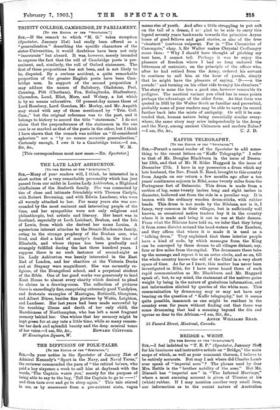THE DIFFUSION OF FOLK-TALES.
[To THE EDITOR OF THE "SPECTATOR."]
Sra,—In your notice in the Spectator of January 31st of Admiral Kennedy's "Sport in the Navy, and Naval Yarns," the reviewer commended the yarn of "the retired bo'sun, who paid a boy sixpence a week to call him at daybreak with the words, 'The Captain wants you,' merely for the purpose of being able to say to the boy, 'Tell the Captain to go to —! ' and then turn over and go to sleep again." This tale stirred in me, as by anamnesis from a pre-existent state, vague
memo ries of youth. And after a little struggling to put salt on the tail of a dream, I ar, glad to be able to carry this legend seventy years backwards towards the primitive Aryan home of good fellows and good stories, as also of the true "chestnut" (castanea tndgaris). For in "The Chronicles of Canongate," chap. 5, Sir Walter makes Chrystal Croftangry muse thus: "Why I should have thought of pitching my tent here, I cannot tell. Perhaps it was to enjoy the pleasure of freedom where I had so long endured the bitterness of restraint; on the principle of the officer who, after be had retired from the Army, ordered his servant to continue to call him at the hour of parade, simply that he might have the pleasure of saying, ' D—n the parade ! ' and turning on his other side to enjoy his slumbers." The story is none the less a good one, however venerable its pedigree. The nautical variant you cited has in some points perhaps the advantage of the older form. As that form was quoted in 1831 by Sir Walter Scott as familiar and proverbial, probably some of your readers may be able to carry its record further back into the mists of antiquity. Or will it be con- tended that, human nature being essentially similar every- where, the same story may arise independently in the Army and the Navy, among ancient Chinamen and modern Zulus ?










































 Previous page
Previous page